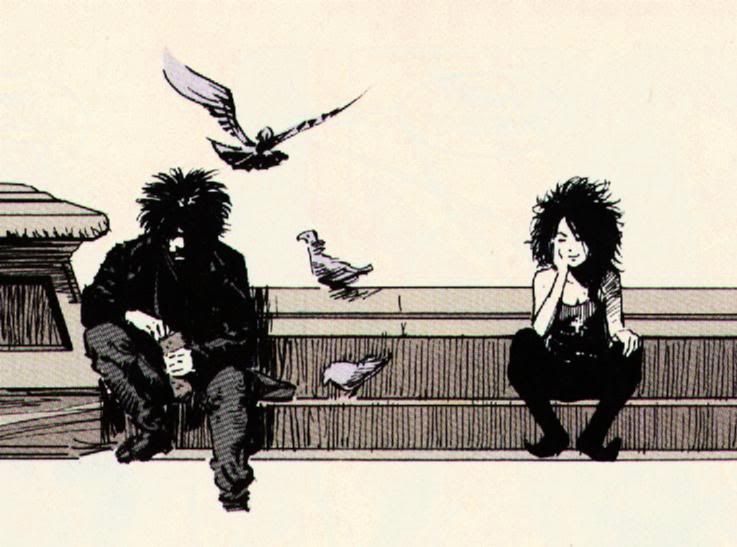
When I first read this story a decade ago as a deeply depressed teenager, I got it completely. It's not a good place to be, being able to relate to a character who would go to almost any lengths to end her own suffering. Basically, I related to it on a very superficial level, and not in a way that helps me to appreciate the story now.
Now that I'm completely distanced from that sort of angst, I freely admit that there are a number of things in this story that I really don't get. Urania Blackwell comes off as, well, self-involved, just as Death says. Initially, it seems that her main problem is loneliness, the sort of loneliness that comes with retiring without a family, and suddenly losing the majority of her human contact. But the more we find out that her isolation is self-perpetrated, the less sympathy I have.
There's another reason that this story felt more poignant ten years ago than it does now: the superhero genre hadn't been demystified to quite the same extent that it has now. At the time, Watchmen was the only widely-read comic that addressed what happens when superheroes stop being heroes (nerds, correct me in the comments. I know there's that one where Superman gets old...or is it Batman?).
So in that context, "Facade" bursts on the scene like Sylvia Plath or T.S. Eliot after decades of Keats, Wordsworth and Robert Frost. It's not that the former is substantively superior to the latter, just that it feels fresh precisely because it adds something new, explores a new facade, if you will. Likewise, "Facade" shows the darker inner life of a superhero (the real darkness -- depression and mental health issues -- not origin-story trauma or hackneyed "why can't I just have a normal life" whining). But since this issue came out, we've had an embarrassment of stories that deal with the real emotional consequences of superheroing: Heroes, Smallville, Harry Potter, Hunger Games, and that's just off the top of my head. Compared to some of the real trauma those characters go through, it's difficult to feel sympathetic to Urania's "I hate my life because I'm so hideous" angst.
But, as with most stories in Sandman, you have to look at both the literal story and the metaphorical one. The metaphorical story is fine, psychologically disturbing in the way we've come to expect from the series. But "Facade" is rare in that the literal story just doesn't work for me. I'll discuss both below.
THE LITERAL STORY, or, THE FACADE OF THE STORY, if you will
Urania's power is that she can take on whatever shape or form she desires by manipulating the elements. However, she's isolated herself because she no longer desires to use her powers to go out into the real world. It's not clear from the story whether her face was turned hideous from her superhero birth, or whether it's a more recent development, and I think that's important to know. I don't know if I would have more or less sympathy if I knew either way (maybe more if she's had this face her entire superhero life, and now she's tired of the disguises).
But, as these things happen, Death is in the building when Urania sinks into pits of despair. Death says, "I'm not blessed. I'm not merciful. I'm just me. I've got a job to do, and I do it." Is it possible that she contradicts herself, showing mercy to Urania, because she knows that Urania is a hopeless case? To my mind, it's well within the scope of possibility that Urania is physically capable of overcoming her weakness and moving past her depression, but maybe Death sizes up the situation and basically goes, "No, this one isn't going to do anything but stay at home and whine about her face."
THE METAPHORICAL STORY, or, UNDER THE FACADE
There are two stories hinted at about Urania that run concurrently. (This duality may be why the story just doesn't come together for me).
First, there's the hint that Urania has been stuck like this for however many years: that she is fundamentally immutable, and that inability to change, to transform, to grow has led to the warp of her insides. She alternates between her hideous unaltered self and that perfect facade, the one that's on file with the Company, the one that makes her look as young as ever even when she feels older than ever. In this manner, she resembles not only the Endless, but Hob. (there's a nifty parallel here: In Death's last story, she grants immortality, in this one, she takes it away).
Secondly, you can read Urania as a character who has lost all identity. She can only wear the faces from the past, she even collects them as memories or remnants of when she felt human, or superhuman. Maybe it's retiring from the Company, or maybe there's some other traumatic event we aren't privy to, but perhaps she has lost herself, and knows that putting on those faces is putting on an old identity, one that isn't her anymore. Perhaps this is why she freaks out when her friend informs her of her pregnancy. There's another identity that's lost to her, that she can never have.
She even looks at the retarded kids with longing; they may be mentally disabled, but they're happy. Another identity she cannot have, that of a happy ignorant person. One might say they are the true counterpoint to Urania; enlightenment led to her ruin, quite literally.
And perhaps she feels that when there are no identities left for her to adopt, it's time for death. And luckily for Urania, Death turns up, right on time.
Phew! Sorry for being so long-winded. Since this post was so late I thought I'd give you extra bang for your buck!
I heartily recommend Matt Cheney's discussion of "Facade", it's a poignant tale of its own: http://www.boomtron.com/2010/12/sandman-meditations-facade-neil-gaiman/

